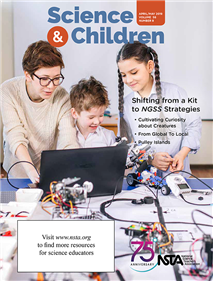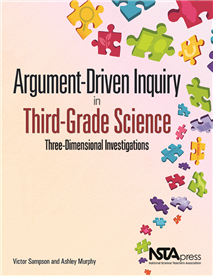All Resources
Journal
Science and Children—April/May 2019
Even the most exquisitely designed science kit will fall short. The articles in this month’s issue of Science and Children transcend cookbook-type teaching approaches and strategies by providing students with wholesome, fully balanced learning sit...
Journal
Biological evolution is a concept students must understand to achieve science literacy. Learn how you can strengthen students’ understanding of this concept with the articles found in in this issue of Science Scope....
Book Chapter
This lesson is designed to help students figure out what types of objects are attracted to a magnet. Students use what they know about magnetism, properties of matter, and patterns to design and carry out the investigation. They will learn about the ...
Book Chapter
In this lesson, the students’ investigation proposal should include the guiding question, How does changing the distance between two magnets affect magnetic force strength? The goal is to figure out how changing the distance between two magnets (a ...
Book Chapter
In this lesson, the students’ investigation proposal should include the guiding question, Where will the marble be located each time it changes direction in a half-pipe?The investigation gives students an opportunity to figure out how to predict t...
Book Chapter
The guiding question of this investigation is, How do balanced and unbalanced forces acting on an object affect the motion of that object? Students are asked to use what they know about forces, motion, patterns, and cause and effect to design and car...
Book Chapter
The guiding question of this investigation is, How are the life cycles of living things similar and how are they different? The purpose is to give students an opportunity to use the disciplinary core idea growth and development of organisms and the c...
Book Chapter
The guiding question of this investigation is, Why do wolves live in groups? The purpose of the investigation is to use the disciplinary core idea social interactions and group behavior and the crosscutting concept of cause and effect to give studen...
Book Chapter
The guiding question and purpose of this investigation is to figure out, How similar are earthworms to each other? Accomplishing this task, students will need to make observations about and take measurements of the traits of earthworms. The Teacher...
Book Chapter
The guiding question of this investigation is, How similar are offspring to their parents? Students will use what they know about traits and patterns to design and carry out an investigation to determine which traits parents and offspring have in ...
Book Chapter
The guiding question of this investigation is, How do differences in soil quality affect the traits of a plant? Students will use what they know about cause and effect to plan and carry out an investigation to determine how a change in amount of wat...





